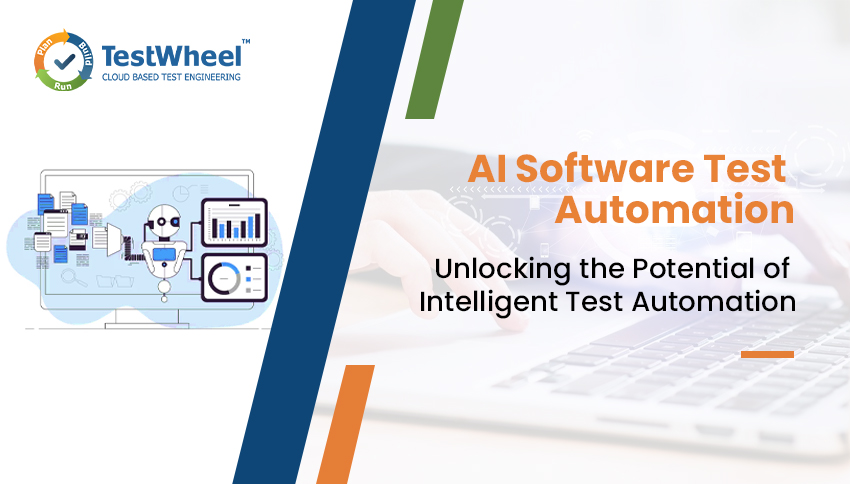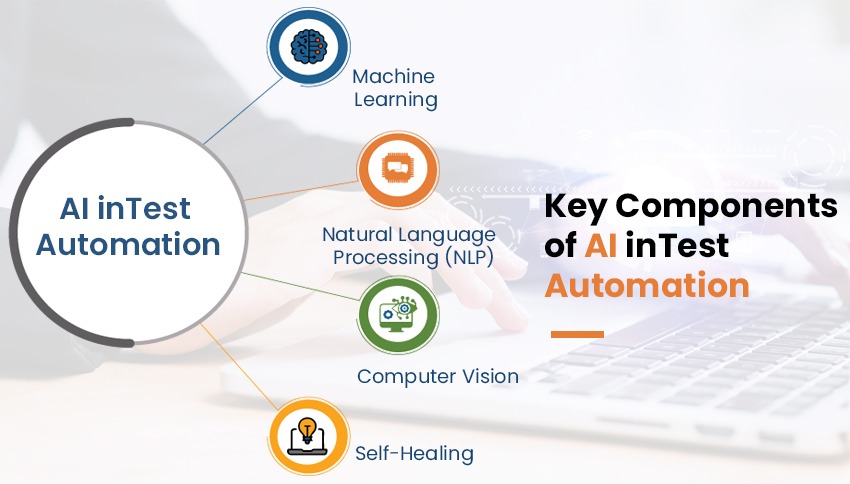- March 1, 2024

In the ever-evolving digital landscape, it is inevitable to hear the term “AI”. All businesses are turning towards AI-powered solutions, and software development is no exception. The implementation of AI or Artificial intelligence in the software testing process ensures product quality and reliability. To stand out in the market and remain competitive, enabling AI technology in organizations is paramount. In this article, let’s delve more into AI in software test automation.
What is AI?
AI or Artificial Intelligence is pre-programmed technology that effectively performs tasks with minimal human intervention. The activities include learning, data processing, language understanding, dynamically responding to queries, and even decision-making. Leveraging AI technology, enterprises increase overall performance and minimize the time consuming to perform complex tasks. Any application with AI features yields people’s attraction and drives business growth seamlessly.
Understanding AI in Software Test Automation
AI in software test automation refers to validating the application functionality, stability, and reliability by incorporating AI in the testing tool. Leveraging AI in software test automation provides enhanced test results and saves time and effort. Rather than traditional software testing, AI seamlessly automates complex test cases and reduces the bugs. The manual software can be suitable for small and straightforward projects, but for large projects, there should be multiple modules in the project which testers require to validate each. In that case, the AI test automation executes the test case and maintains the accuracy of the entire project.
Key Components of AI in Test Automation
Machine Learning Algorithm: The machine learning algorithm in the test automation enables learning and progressing the test suite in the aspect of application pattern, predicting the potential issues, and dynamically adjusting test scripts based on its behavior.
Natural Language Processing: Natural Language Processing (NLP) is a connecting bridge between the human language and machine language. The NLP allows users to create the test scripts using plain English and it doesn’t require them to be proficient in a programming language.
Computer Vision: The user interface is an important consideration when doing software testing. Computer vision assists in identifying the issues that arise in the UI elements and ensures the visual integrity of the application.
Self-Healing: The AI-powered self-healing mechanism automatically detects the changes in the test script. It accelerates productivity by automatically healing the existing broken elements or objects and minimizes manual intervention.

Benefits of AI in Software Test Automation
Efficient Test Script Generation: Rather than investing time in the traditional testing process to generate test scripts, The AI algorithm testing platform allows testers to seamlessly generate multiple and complex test scripts.
Adaptive Test Maintenance: The AI-powered testing tool efficiently reduces maintenance by dynamically adapting to changes in the codes.
Ensures Accuracy: Executing large-scale testing processes causes human errors. The AI-enabled testing platform reduces human errors and ensures the accuracy of the test suite.
CI/CD Pipeline: Organizations adapting to Agile methodology are required to perform continuous releases. The AI-enabled testing platform allows us to seamlessly integrate the CI/CD pipelines into the development process.
Performance Optimization: Any kind of application performance is crucial to impress the users. AI-powered testing platform automates the performance testing based on the application behavior and optimizes it.
Enhancing Testing Activities through the Application of Generative AI
Generative AI is both a hyped and a helpful technology when used with due care and responsibility. There are currently several ways in which AI tools that are driven by large language models can assist software engineering leaders and their teams when it comes to software quality and testing.
Below is some information on how generative AI improves software quality and testing,
- The generative AI language model automates the test cases consistently and reduces manual effort with its intelligent decision-making.
- Whenever new features are added or any modification in the existing test suite testers are not required to update it manually. The generative automatically updates the code changes.
- Acquire immediate feedback when running a large portion of the test suite. In the manual testing process, receiving feedback can be delayed.
- In the manual testing process, testers typically focus only on specific use cases or modules. Generative AI application enables testers to create and execute a wider variety of more complex test cases.
- Leveraging the AI software testing platform encourages collaboration between testing and developer teams.
Forbes predicts a 37.3% growth in AI usage within software testing from 2023 to 2030, highlighting its significant potential
Future of Software AI Testing
As AI evolves, the complexities in the software testing process shift easily. The combination of machine learning, natural language processing, and self-healing mechanisms ensures the accuracy, performance, and stability of the released application. Software development businesses must adopt AI transformation to stay ahead in the digital world. TestWheel is the ideal platform for today’s business strategies and offers seamless AI-driven test automation services. Starting from creating the test application to generating test insights reports, we automate the process and minimize the workload.
Whether it’s a small or large-scale project, the TestWheel framework is designed to adapt to global businesses and ensure software quality. If you are looking for a smart testing platform with all the AI-powered features, then TestWheel is the perfect choice for your business.
